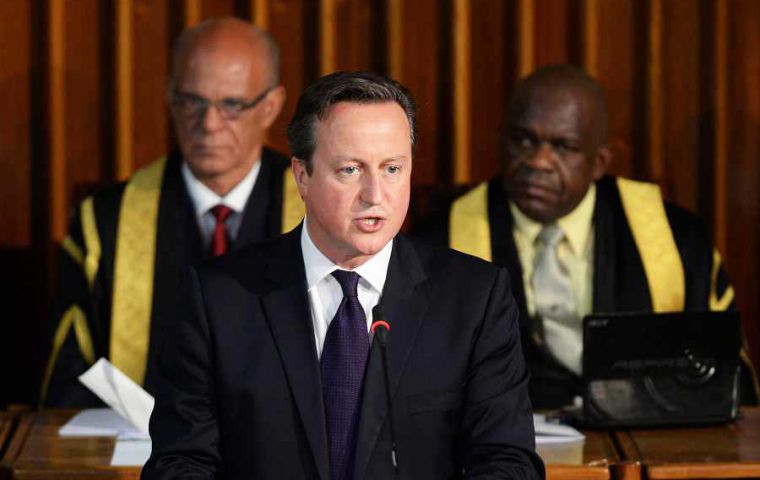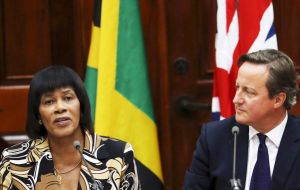MercoPress. South Atlantic News Agency
Cameron rules out reparations for slave trade and urges Caribbean countries to 'move on'
 Britain's PM Cameron said he hoped “we can move on from this painful legacy and continue to build for the future.”
Britain's PM Cameron said he hoped “we can move on from this painful legacy and continue to build for the future.”  Jamaica PM said she was “aware of the obvious sensitivities”, but was “involved in a process under the auspices of Caricom to engage the UK on the matter”.
Jamaica PM said she was “aware of the obvious sensitivities”, but was “involved in a process under the auspices of Caricom to engage the UK on the matter”. Prime Minister David Cameron has ruled out making reparations for Britain's role in the historic slave trade and urged Caribbean countries to “move on”. Cameron acknowledged that “these wounds run very deep” during his visit to Jamaica, where he faced calls to apologize from campaigners.
He said Britain's role in wiping slavery “off the face of our planet” should be remembered. Jamaican PM Portia Simpson Miller said she had raised the issue in talks with Cameron.
Addressing MPs in Jamaica's parliament, Cameron said slavery was “abhorrent in all its forms”. He added: “I do hope that, as friends who have gone through so much together since those darkest of times, we can move on from this painful legacy and continue to build for the future.”
Cameron also announced £25m in British aid for a new Jamaican prison and a £300m development package for the Caribbean which will provide grants for infrastructure projects, including roads and bridges.
He said his visit -the first by a British prime minister in 14 years- was to “reinvigorate” ties between the countries, and that he wanted to concentrate on future relations rather than centuries-old issues.
Mrs Simpson Miller said while she was “aware of the obvious sensitivities”, Jamaica was “involved in a process under the auspices of the Caribbean Community [Caricom] to engage the UK on the matter”.
The issue of former slave-owning nations compensating former colonies is a contentious one in the Caribbean, where national commissions have calculated the sums could run into trillions of dollars. One suggestion has been that the money could be provided in the form of debt relief.
Mrs Simpson Miller told the United Nations in 2013 there should be “an international discussion in a non-confrontational manner” and its parliament had passed a motion backing reparations.
For more than 200 years Britain was at the heart of a lucrative transatlantic trade in millions of enslaved Africans. According to ship records it is estimated about 12.5 million people were transported as slaves from Africa to the Americas and the Caribbean - to work in often brutal conditions on plantations - from the 16th century until the trade was banned in 1807.
In 1833, Britain emancipated its enslaved people and raised the equivalent of £17bn in compensation money to be paid to 46,000 of Britain's slave-owners for “loss of human property”. University College London has compiled a database of those compensated.
Among those listed is General Sir James Duff, who it is claimed is a first cousin six times removed of David Cameron. He was awarded compensation worth about £3m in today's terms. Others who received compensation include the ancestors of novelists George Orwell and Graham Greene, as well as distant relatives of Arts Council chairman Sir Peter Bazalgette and celebrity chef Ainsley Harriott.
Campaigners also called on PM Cameron to make a personal apology, saying one of his own ancestors was paid compensation for the loss of his slaves in 1834.
Bert Samuels, a member of Jamaica's National Commission on Reparations, told Television Jamaica “he needs to atone, to apologize personally and on behalf of his country”.
Sir Hilary Beckles, chairman of Caricom's reparations commission, wrote in an open letter in the Jamaica Observer that the UK must “play its part in cleaning up this monumental mess of Empire”
Labor leader Jeremy Corbyn, who lived in Jamaica for two years in his youth, said that, as prime minister, he would be ready to apologize for the slave trade.
Speaking at Labor's annual conference in Brighton, Mr Corbyn said it was “the most brutal part of our history and the history of Jamaica”.
During his two-day visit, PM Cameron revealed the UK will spend £25m on building a prison in Jamaica so that foreign criminals in the UK can be sent home to serve sentences in the Caribbean. More than 600 Jamaican nationals are in UK jails but cannot be deported because of Jamaica's poor prison conditions.




Top Comments
Disclaimer & comment rules-

-

-

Read all commentsIt's only when they invent something they are all responsible...
Oct 01st, 2015 - 08:55 am 0Horrible as the slave trade was, would the Jamaicans of African descent rather live in Africa OR are they much better off where they are now ?
Oct 01st, 2015 - 09:31 am 0I don't see any evidence of boat loads heading for Senegal, Gambia, Nigeria or any other west African state.
As to compensation, how far back in history do we go. Do we demand from the Romans, Scandinavians, N.Africans compensation for enslaving Britons and selling them in slave markets. African tribes made a fortune out of slavery of neighbouring tribes. The Arabs are still at it.
Well, at some point Europe stopped sacking Africa for human beings, never did they stop the sacking of natural ressources...
Oct 01st, 2015 - 09:53 am 0Commenting for this story is now closed.
If you have a Facebook account, become a fan and comment on our Facebook Page!